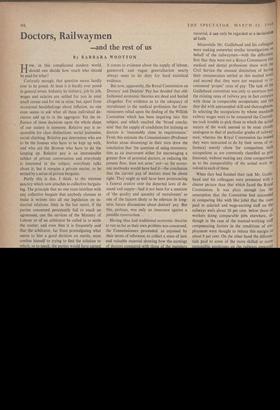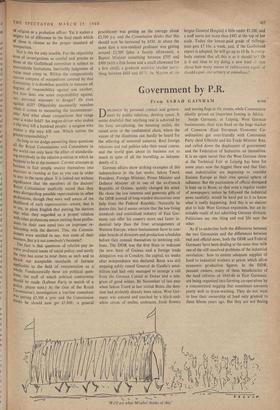Doctors, Railwaymen
—and the rest of us
By BARBARA WOOTTON How, in this complicated modern world, should one decide how much who should be paid for what?
Curiously enough, that question seems hardly ever to be posed. At least it is hardly ever posed in general terms. Industry by industry, job by job, wages and salaries are settled for you in your small corner and for me in mine; but, apart from occasional headshakings about inflation, no one even seems to ask what all these individual de- cisions add up to in the aggregate. Yet the in- fluence of these decisions upon the whole shape of our society is immense. Relative pay is re- sponsible for class distinctions, social jealousies, social climbing. Relative pay determines who are to be the Joneses who have to be kept up with, and who are the Browns who have to do the keeping up. Relative pay is an interminable subject of private conversation and everybody is interested in the subject, everybody talks about it; but it remains a private matter, to be settled by a series of private bargains.
Partly this is due, I think, to the extreme sanctity which now attaches to collective bargain- ing. The principle that no one must interfere with any collective bargain that anybody chooses to make is written into all our legislation on in- dustrial relations. Only in the last resort, if the parties concerned persistently fail to reach an agreement, can the services of the Ministry of Labour or of an arbitrator be called in to settle the matter; and even then it is frequently said that the arbitrator, far from promulgating what seems to him a good decision on merits, must confine himself to trying to find the solution to which, so to sneak, the narties would have agreed it comes to evidence about the supply of labour, guesswork and vague generalisation nearly always seem to do duty for hard statistical evidence.
But now, apparently, the Royal Commission on Doctors' and Dentists' Pay has decided that old- fashioned economic theories are dead and buried altogether. For evidence as to the adequacy of recruitment to the medical profession the Com- missioners relied upon the finding of the Willink Committee which has been inquiring into this subject, and which reached the 'broad conclu- sion' that the supply of c.andidates for training as doctors is `reasonably close to requirements.' From this estimate the Commissioners (Professor Jewkes alone dissenting) in their turn drew the conclusion that 'the question of using remunera- tion as an instrument either for encouraging a greater flow of potential doctors, or reducing the present flow, does not arise.' not—as the econo- mic textbooks would have had it—the conclusion that the current pay of doctors must be about right. They might as well have been pronouncing a funeral oration over the departed laws of de- mand and supply—hid it not been for a mention of 'the quality and quantity of recruitment' as one of the factors likely to be relevant in long- term future discussions about doctors' pay. But this, perhaps, was only an insurance against a possible resurrection.
Having thus laid traditional economic theories to rest so far as their own problem was concerned, the Commissioners proceeded, as enjoined by their terms of reference, to collect a mass of new and valuable material showing how the earnings of doctors compared with those of Ihc members material, it can only be regarded as a declaratioS of faith.
Meanwhile Mr. Guillebaud and his colleagues were making somewhat similar investigations oe behalf of the railwaymen—with the difference, first that they were not a Royai Commission (the medical and dental professions share with the Civil Service the unusual distinction of having their remuneration settled at this exalted level) and second that they were not required to re- commend 'proper' rates of pay. The task of the Guillebaud committee was only to ascertain hoW the existing rates of railway pay in fact compare with those in comparable occupations; and this they did with unexampled skill and thoroughness. In selecting the occupations by whose standards railway wages were to be measured the Commit- tee took trouble to pick those in which the actual nature of the work seemed to be most closely analogous to that of particular grades of railway' men; whereas the Royal Commission (as indeed they were instructed to do by their terms of re' ference) merely chose 'for comparison such occupations as are commonly classified as pro- fessional, without making any close comparisons as to the comparability of the actual work in' volved in each of these.
When they had finished their task Mr. Guille- baud and his colleagues were presented with a clearer picture than that which faced the Royal Commission. It was plain enough (on the assumption that the Committee had succeeded in comparing like with like jobs) that the rates paid to salaried and wage-earning staff on the railways were about 10 per cent. below those of workers doing comparable jobs elsewhere, al' though in the case of the manual-working staff compensating factors in the conditions of en' ployment were thought to reduce this margin to about 8 per cent. On the other hand the differen- tials paid to some of the more skilled or more rcNnonsihle omnIcivpec t hp rniltunuc nnno,Ired of religion or a probation officer. Yet it makes a mighty lot of difference to the final result which of these is chosen as the proper standard of comparison.
Nor is this the only trouble. For the objectivity even of investigations as careful and precise as those of the Guillebaud committee is subject to unavoidable limitations. Inevitably judgments of value must creep in. Within the comparatively narrow compass of occupations covered by that Committee, it is doubtless possible to measure off degrees of responsibility against one another; but how does one score responsibility against, say: personal exposure to danger? Or even against skill? Objectivity necessarily vanishes When it comes to measuring the incommensur- able. And what about comparisons that range over a wider field? An engine-driver who makes a slip may kill a hundred people: a surgeon who makes a slip may kill one. Which carries the greater responsibility? As long as we dodge answering these questions all the Royal Commissions and Committees in the world can only have the effect of standardis- ing everybody in the relative position in which he haPpens to be at the moment. Current attempts at fairness in fact simply resolve themselves into exercises in running as fast as you can in order to sta- y in the same place. It is indeed not without significance that the members of the doctors' k'Yal Commission explicitly stated that they were disregarding possible repercussions in other Professions , though they were well aware of the likelihood of such repercussions—aware, that is t.° say, in plain English that putting the doctors into what they regarded as a proper relation With other professions meant putting those profes- si°ns (in their own eyes) into an improper re- lationship with the doctors. This, the Commis- sioners were entitled to say, was none of their business. But is it not somebody's business? The fact is that questions of relative pay in- vnlve profound issues of social policy; and surely the time has come to treat them as such and to thrash out acceptable standards of fairness applicable to the field of remuneration as a Whole. Fundamentally these are political ques- tinns, the stuff of which political controversy Should be made. (Labour Party in search of a ,..,/)°IieY, please note.) At the time of the Royal "inmission's investigation a top-line consultant Was getting £5,300 a year and the Commission thinks he should now get £7,900: a general practitioner was getting on the average about £2,100 p.a. and the Commission thinks that this should now be increased by £450. At about the same date a non-medical professor was getting around £2,509 (plus a family allowance), a Baptist Minister something between £395 and £900 (with a free house and a small allowance for a first child), a graduate assistant teacher some- thing between £603 and £87S. he Matron of ine largest General Hospital a little under £1,200, and a staff nurse not more than £485 at the top of her scale. Today the lowest-paid grade of railway- man gets £7 16s. a week, and, if the Guillebaud report is adopted, he will go up to £8 8s. Is every- body content that all this is as it should be? Or is it not time to try doing a new kind of sum about how many nurses or railwaymen equal, or should equal, k ne actuary or consultant?



















































 Previous page
Previous page